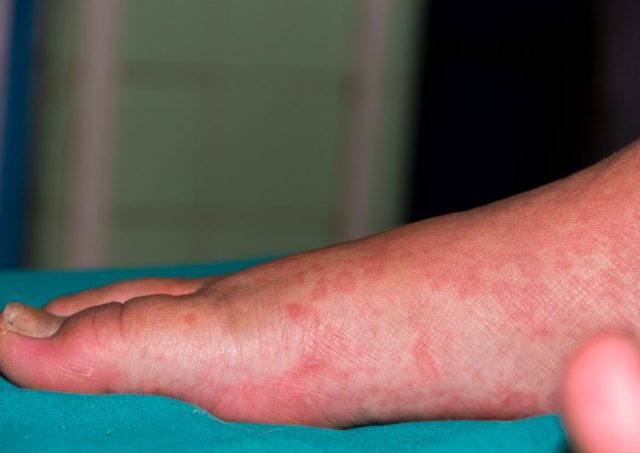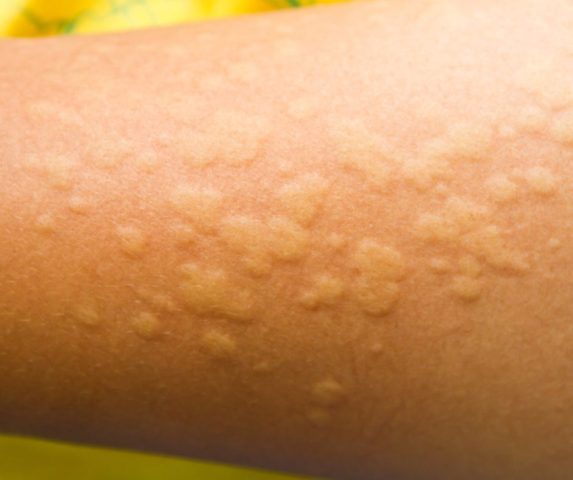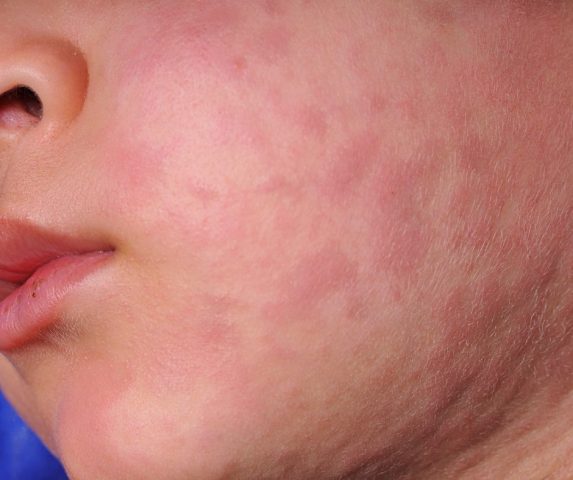3 Ways To Treat Idiopathic Urticaria: Complete Guide 2024
By Vanessa Richards
January 10, 2024 • Fact checked by Dumb Little Man

Urticaria is quite common and often easy to spot by some red and itchy spots. Normally, it barely lasts for a few days. It can sometimes become chronic and last for more than six weeks.
In this case, the condition can be diagnosed as chronic idiopathic urticaria. Lots of people struggle with it, and in some severe cases, it may last for more than a year.
It is worth noting that such cases tend to be more common in those with underlying conditions – such as autoimmune diseases. But then, there are many cases where the cause is not known at all.
More treatments can soothe the symptoms of chronic urticaria – even chronic spontaneous urticaria. To overcome these chronic hives, you must first be aware of the signs and causes.
What is Idiopathic Urticaria?

Idiopathic urticaria is identified by red and itchy welts or bumps. It can appear on the skin in random places, usually more than once a week.
The condition becomes chronic when it persists, even if sticking to a particular treatment. It is also idiopathic because sometimes, symptoms do not have any causes. Other times, it could be an allergic reaction.
As for urticaria, this is the technical term for hives.
Now, hives can occur by themselves, or they may also bring in swelling – also known as angioedema. Unlike the actual hives, which are raised, angioedema occurs in deeper layers of the skin. Both issues can target the face, hands, feet, lips, throat, and even genitals – pretty much any part of the body.
Hives are quite common, though. They normally fade within a day or two, yet if the cause is not eliminated, new hives may also replace them. They tend to go away within six weeks – usually, much less than that.
As for chronic hives, they last for ages – hence the condition called chronic idiopathic urticaria. They can become quite annoying, and they tend to become visible and itchy twice or more every week. The condition persists for over six weeks – in some cases, it lasts for over a year.
Believe it or not, about 5% of all people end up with chronic hives. The condition can occur anytime and at any age – gender is also irrelevant. However, based on research, it seems more common in women over 30 years old – younger than 50 too.
Now, what are the signs of chronic idiopathic urticaria, and how can you annihilate the condition?
Symptoms of Idiopathic Urticaria

Acute urticaria has similar symptoms, whether it is chronic refractory urticaria or an issue caused by autoimmune diseases – such as systemic lupus erythematosus. It is worth noting that some people may experience all the symptoms in the book, while others may only end up with a few hives.
Batches of welts or wheals represent the most common sign. Again, they may show up anywhere on your body, including areas where you would never expect them – such as your lips or perhaps your genitals. They tend to persist for a long period – over six months to identify chronic urticaria.
Welts could be purple or red, but they may also have your skin color. Their color depends on your skin color – the same rule applies to other types of urticaria, such as autoimmune urticaria, cholinergic urticaria, or acute urticaria.
Then, welts will vary in size. They may change shape over time, and they may fade now and then, but new ones may show up somewhere else. Itchy skin is a direct consequence of these welts, and it can get quite intense, whether the affection is caused by thyroid disease or allergy asthma.
Painful swelling could be a sign of chronic urticaria, too – known as angioedema. These signs tend to affect your face – mostly the cheeks, but they may also spread to your lips or cheeks.
Flares are also quite common and often triggered by too much stress, intense exercise, or heat.
Apart from the classic skin-colored or red bumps, you may also end up with swollen hands or feet, as well as swollen lips and eyes. Your airways may go narrow, meaning you could face breathing issues.
Abdominal pain is also among other symptoms, not to mention nausea, unconsciousness, or feeling faint.
Causes of Idiopathic Urticaria
Chronic idiopathic urticaria is often associated with an allergy, but it is not part of the wide category of allergic reactions. Your clinical immunology has nothing to do with it. Also, it is not contagious, according to most specialists, it is usually caused by more factors.
Environmental irritants and pollution are some of the top factors.
Then, you have the immune system – an autoimmune disease can often be responsible for it.
Genetics should be considered, too, not to mention the body's response to various infections.
The treatment of chronic urticaria implies assessing the causes first, which goes even further. It seems the affection activates the immune response system and will also affect the clotting capabilities of blood, as well as nerve hormones.
Other things that can cause chronic urticaria to include:
- Specific nonsteroidal anti-inflammatory drugs
- Tricyclic antidepressant doxepin
- Parasites and insects
- Intense cold or heat
- Excessive sunlight
- Food allergies
- Alcohol consumption
- Constant scratching
- Too much exercise or tight clothes
Known as a systemic disease, physical urticaria is also connected to the thyroid. Many patients seem to have hypothyroidism in an incipient or severe stage. Most of them have anti-TPO antibodies, which also indicate an autoimmune disease.
Tips: Your healthcare provider will have to determine the known cause before providing symptom relief. Causes of itchy bumps are often identified with a blood test, but allergy testing (even a food allergy could be an issue) is just as common to control symptoms.
You need to consider seeing healthcare providers if you have constant flare-ups and they last for six or more weeks. Long-lasting hives should raise some question marks, especially if they also cause dry skin. Only then a professional can prescribe an appropriate treatment for chronic urticaria.
Risks of Idiopathic Urticaria
About 25% of all people with extremely itchy hives – whether or not there is an allergy foundation – will also develop angioedema, which affects deeper tissues and causes swelling. Anyhow, the differential diagnosis means the cause must be identified too.
Further risks and complications involve affecting the quality of life.
Back to angioedema, it is rarely mild but quite intense. It is caused by fluids building up. Symptoms can target any part of the body, but it is more common around the face, hands, feet, and genitals.
Although urticaria and angioedema come together, one can be severe, and the other can be mild. According to most healthcare professionals, other skin conditions have not been associated with flare-ups.
Urticaria could also be one of the common triggers for anaphylaxis – the medical term for severe allergies. This issue should never be overlooked – seek help from a healthcare professional as soon as you experience it. It should always be treated like an emergency.
The emotional impact is worth some attention too. While not as aggressive as other diseases, itchy sensations can be extremely problematic and embarrassing. Emotional problems are part of the game, too, and may include depression, anxiety, and a heavy amount of stress.
Isolation is never a solution – instead, there are medications and therapeutic alternatives that can tackle infectious agents, limit the red bumps, and help you get used to them. People living with urticaria do not experience too many adverse effects of such drugs – just part of the treatment.
Treatment
There are more ways to keep chronic urticaria under control. Some solutions are natural and bring in no adverse reactions. In some cases, when you see a doctor, you may be given drugs and medications – a few side effects but worth the positive results.
Here are the best options:
Natural Approach
Ideally, you should stick to foods low in histamines. They are less likely to cause any allergies and reactions, so they are ideal to keep CIU under control. It is not a guaranteed solution, though, but worth a try. Here are some foods to include in your diet:
- Fresh meat
- Dairy products, but no yogurt or cheese
- Pasta
- Most veggies
- Salmon, cod, or trout
- Bread
- Rice
Then, certain foods should be avoided:
- Citrus fruits
- Pineapple
- Nuts
- Alcohol
- Tea
- Papaya
- Egg whites
- Tea
Medications
OTC antihistamines represent the first step in the medical treatment of chronic hives. Some common drugs include loratadine, cetirizine, and fexofenadine, among others. Hives may not always clear up straight away.
Other drugs include H2 blockers, oral corticosteroids, sedative antihistamines, immune suppressants, or monoclonal antibodies. Again, identifying the cause is extremely important in getting the right treatment. Most of these drugs come with mild or moderate adverse reactions though.
Programs and Supplements
Programs and supplements represent another form of a natural approach to treating CIU. They are natural and involve a different approach – no drugs, no side effects, but lifestyle and dietary changes.
1. Life-Changing Urticaria Treatment: Full Urticaria Cure By Dr Gary M.D
Developed by Dr. Gary M. Levin (Herbal Remedies Award Winner), the Full Urticaria program provides a detailed solution to urticaria and hives based on the cause. It will teach you how to identify the cause and make certain lifestyle changes to get rid of it.
This program doesn’t provide any supplements and consists quick start guide and an audio version of the treatment. It will help you understand your condition better and what steps you can take to stop CIU.
Shop Full Urticaria Cure by Dr. Gary M.D. at the Official Website.
2. Supports The Immune System: Nature’s Bounty Vitamin D3
Coming as a supplement in the form of soft gels, Nature's Bounty vitamin D3 acts against a series of issues, including urticaria. It is easy to take. This product supports the immune system, especially if this is the cause of CIU.
Shop Nature's Bounty Vitamin D3 at the Official Website.
3. Top-notch Supplement: Dr. Berg's Vitamin D3 K2
Dr. Berg's supplement is a mix of more nutrients that will help your whole body and not just against urticaria. It includes vitamins D3 and K2, as well as MCT oil, purified bile salts, zinc, and magnesium for top-notch absorption.
Shop Dr. Berg's Vitamin D3 k2 at the Official Website.
>>Related Article: The Dangers of Untreated Cold Urticaria: Complete Guide 2024
Key Takeaway
Chronic idiopathic urticaria affects many people worldwide, and the good news is it can be kept under control, even if there is always a risk of facing it again. While medication may help, adverse reactions point people towards the naturist approach.
There are plenty of choices out there but the choice of programs and supplements stand out based on their popularity and reviews. Lifestyle and dietary changes come first. Full Utricaria Cure by Dr. Gary tackles all directions and provides helpful solutions regardless of the cause. It's easy to follow and starts showing effects from day one.
The Full Urticaria Cure program developed by Dr. Gary M. Levin is the primary choice because it provides natural solutions for any type of urticaria. It is a very comprehensive and detailed guide, several users attest to its effectiveness!
This program won't just help you to treat the condition but will minimize the chances of occurrence in the future.
Click here to get Full Urticaria Cure E-book at a Discounted Price.
>> Related Article: What Causes Eczema Flare-ups? 8 Possible Triggers & Treatments
Idiopathic Urticaria FAQs
Still unsure about the perfect cure for idiopathic urticaria?
Can idiopathic urticaria be cured?
Idiopathic urticaria is not life-threatening but extremely annoying and embarrassing. It can be cleared up with certain treatments – whether natural or based on medications, but at the same time, it may reappear randomly once the treatment is stopped.
How long does idiopathic urticaria last?
The disease is diagnosed when hives last for more than six weeks. In some cases, they may last for more than a year. Some people learn to live with this affection for years. It may come and go randomly, so it is rarely considered fully cured.
Is banana good for idiopathic urticaria?
Bananas are rich in histamines, so they are not recommended in the treatment of idiopathic urticaria.
Vanessa Richards
Vanessa is a mom of 3 lovely children and a software geek. Outside of her career as a health and wellness instructor. She enjoys writing and researching on topics such as finance, software, health and culinary.




